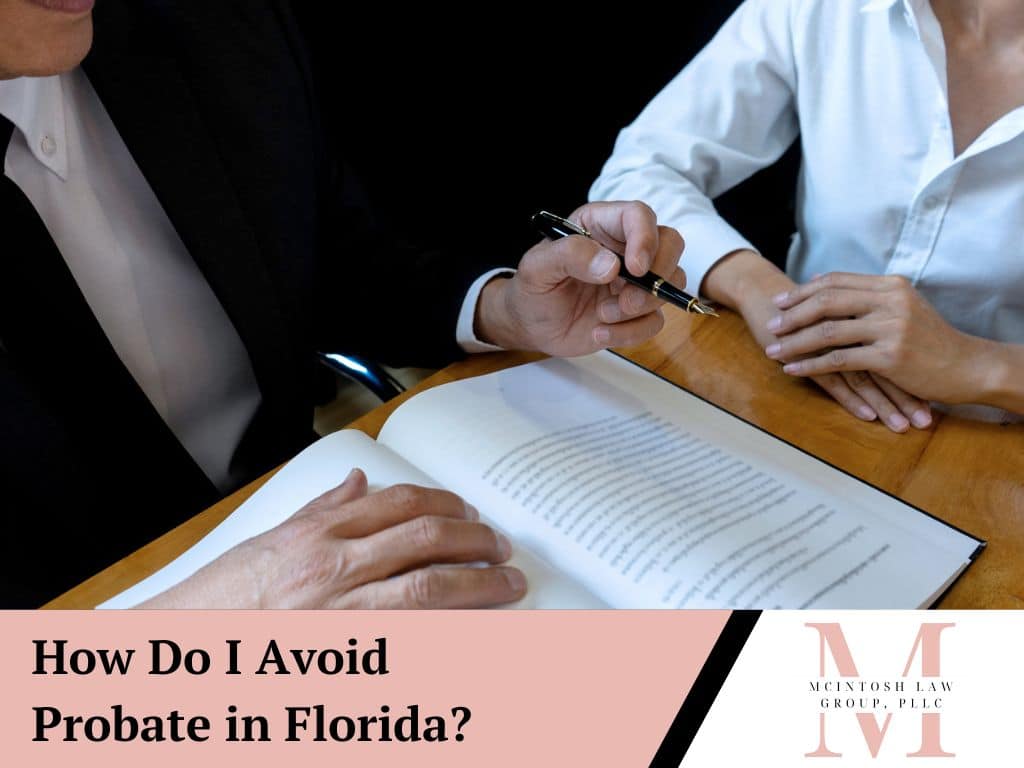How Do I Avoid Probate in Florida?

When a person passes away, their estate typically goes through a process known as probate, unless they have engaged in estate planning. This is the legal procedure through which a deceased person’s assets are distributed to their heirs or beneficiaries under the guidance of the court. While it may sound straightforward, probate can be a lengthy, costly, and public affair, leading many people to seek ways to avoid it. This sentiment is particularly strong in Florida, where the probate laws are known to be more complicated than in other states.
Understanding Probate in Florida
The process of probate involves distributing a deceased person’s assets to their beneficiaries or heirs. Assets that do not have a named beneficiary or rights of survivorship will go through probate, including bank accounts, real estate, vehicles, and personal property. Additionally, any outstanding debts or taxes will be paid during this process.
In Florida, the process involves confirming the true beneficiaries or heirs who will receive the property, settling eligible debts of the estate, and resolving any disagreements among the beneficiaries.
In Florida, probate can be a lengthy and expensive process due to factors such as:
- Mandatory attorney representation for most probate cases
- Complex court procedures and paperwork
- Potential disputes among family members or beneficiaries
For these reasons, many people seek ways to avoid probate and make the estate administration process more efficient and cost-effective.
How to Avoid Probate in Florida
Florida’s probate laws has implications for the venue of a probate case as governed by Florida Statute section 733.101. If a decedent was a Florida resident, the probate case must be filed in the county where they lived when they were alive. For an out-of-state resident, a probate case can be filed in a county where the decedent owned property.
These complications highlight the importance of understanding the probate process in Florida and the various ways to avoid it. For instance, if an asset does not have a named beneficiary or rights of survivorship, it will have to go through probate to change ownership, a process that can tie up estate assets for months or even years.
Thankfully, there are several legal strategies to circumvent the probate process in Florida:
Revocable Living Trusts

A revocable living trust is a planning tool that can hold your assets. During your lifetime, you maintain control over the assets in the trust. Upon your death, the named successor trustee will be able to distribute your assets to your designated beneficiary or beneficiaries in accordance with the terms of the trust and the Florida Trust Code without the need for probate.
Pros:
- Flexibility and control over asset distribution
- Privacy, as trust documents are not public records like probate filings
- The ability to manage assets during your lifetime and plan for incapacity
Cons:
- Can be expensive and time-consuming to set up and maintain
- May not protect assets from creditors
- Can be complicated depending on the nature of your assets
Joint Ownership of Assets

If you co-own property with someone, such as a spouse, the asset can often avoid probate. Types of joint ownership include joint tenancy with the right of survivorship, tenants in common, and tenants by the entirety. Tenants by the entirety is only available for married couples. Tenants in common does not provide any protection from probate.
Pros:
- Simplicity and ease of transferring ownership
- No need for additional legal documents or processes
Cons:
- Loss of control over asset distribution
- Potential tax implications, especially for high-value assets
- Risk of disputes or complications if relationships change
Beneficiary Designations

Certain assets, like life insurance policies and retirement accounts, allow you to name beneficiaries. Upon your death, these assets are paid directly to your beneficiaries, bypassing probate.
Pros:
- Simple and straightforward method of transferring assets
- Can be updated easily if circumstances change
Cons:
- Limited to specific types of assets
- Requires careful consideration of potential conflicts among beneficiaries
Payable on Death (POD) Accounts

Banks and other financial institutions in Florida offer POD accounts. When the account owner passes away, the assets in the account are immediately transferred to the named beneficiaries, avoiding the probate process.
Pros:
- Simple and straightforward method of transferring assets
- Can be updated easily if circumstances change
Cons:
- Limited to specific types of assets
- Requires careful consideration of potential conflicts among beneficiaries
Enhanced Life Estate Deed (Lady Bird Deed)

A Lady Bird deed allows you to designate a beneficiary for your real property, who will inherit the property upon your death without going through probate.
Pros:
- Simple and cost-effective way to transfer real estate
- Retains control over the property during your lifetime
Cons:
- Not the best practice to change the beneficiary multiple times
- Becomes obsolete if you no longer own property
Tax Implications and Legal Considerations
When using these strategies to avoid probate, it is crucial to consider potential tax implications and legal complications. For example:
- Gifting assets before death may trigger gift taxes
- Joint ownership or beneficiary designations may have unintended consequences for your overall estate plan and tax liabilities
To minimize potential issues, consult with professional legal and financial advisors who can help you navigate the complexities of estate planning and probate avoidance.
Seek Professional Legal and Financial Advice
Seeking professional legal and financial advice is essential when considering probate avoidance strategies. An experienced estate planning attorney can help you develop a personalized plan that addresses your unique circumstances and goals while minimizing potential drawbacks and complications.
Can’t Prevent Probate?
In conclusion, avoiding probate is possible with careful planning and a thorough understanding of the potential drawbacks and limitations of various strategies. By seeking professional advice and considering all aspects of your estate planning process, you can protect your assets and ensure a smooth transition for your loved ones.
If you find that you can’t prevent probate, it’s crucial to have an experienced probate attorney by your side. Colleen McIntosh can guide you through the process. Colleen understands the complexities of Florida probate law and can provide the support and expertise needed to navigate this challenging time.
Remember, you don’t have to go through it alone. For a complimentary consultation, reach out to Colleen McIntosh at (727) 404-2018. Your peace of mind is worth the call.

